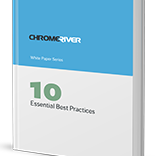 Editor’s Note: This article is third in a four-part series on reporting travel and entertainment expenses. Part 2 can be found here.
Editor’s Note: This article is third in a four-part series on reporting travel and entertainment expenses. Part 2 can be found here.
For most full-time employees, annual compensation is more than just a salary. An employer typically offers such additional benefits as health insurance, tuition reimbursement and access to a company retirement plan. Since these benefits are significant, the IRS takes a healthy interest in such alternative forms of compensation. Using an automated expense policy and expense management software like Chrome River EXPENSE can help ensure your company correctly reports fringe benefits and withholds the required income and employment taxes.
Unless specifically exempt, a fringe benefit is considered taxable income, subject to the standard withholding and reporting requirements. The issue for accounts payable and compliance professionals is determining which fringe benefits are taxable and which are exempt, or “excluded.”
Cokala Tax Information Reporting Solutions Principal Marianne Couch sheds some light on how to simplify fringe benefits and their exclusions. Here are two examples of fringe benefits with exclusions.
- Educational-assistance plans. Employers may encourage ongoing education by covering such costs as supplies, books and tuition. Like most exclusions, educational assistance involves complex rules and stipulations. For example, educational reimbursements are generally capped at $5,250 per year; any more is considered part of an employee’s taxable wages.
- Moving-expense reimbursement. When transferring an employee to another location, a company may provide tax-exempt reimbursement for travel expenses, according to IRS Pub. 15-B. As with educational assistance, stipulations apply. For example, the employee’s new workplace must be at least 50 miles away from the previous location.
Exclusion rules exist for many fringe benefits, from achievement awards and stock options to expense reimbursements and life insurance. Plus, exclusions often come with unique rules that can increase the complexity of expense reporting.
The key to managing these challenges effectively is creating clear expense policies and using effective expense management software like Chrome River EXPENSE. Establishing clear policies can minimize corporate exposure to financial and operating penalties. It will also help ensure compliance with local, state, national and international tax laws, which often differ in scope and reporting requirements.
Companies can further simplify the task of complying with exclusion rules by using automation supplied by expense management software. An automated expense policy takes your business rules and integrates them with the software tools your company uses to authorize, procure, track, process and reimburse business-related expenses.
In the end, a company must correctly report and manage the fringe benefits it offers employees. An automated expense policy and expense management software can streamline the reimbursement process and reduce the complexity of adhering to IRS rules for fringe benefits.
For more tips, watch for the last in our four-part series on how to report travel and entertainment expenses.
Source: IRS.gov, Institute of Finance and Management webinar
Subscribe
Latest Posts
Posts by Category
I just love the Chrome River application. I could probably sell it! Finance Administrative Coordinator Law Firm, 800 Employees
Can’t we just move year-end, so that we can roll out Chrome River sooner!? Financial Systems Director Law Firm, 300 Employees


Comments